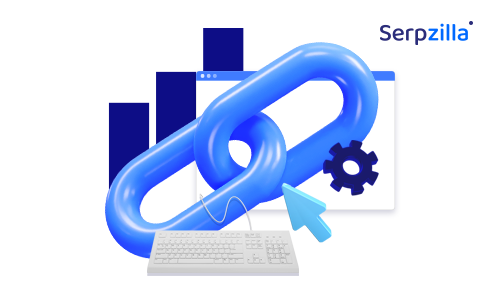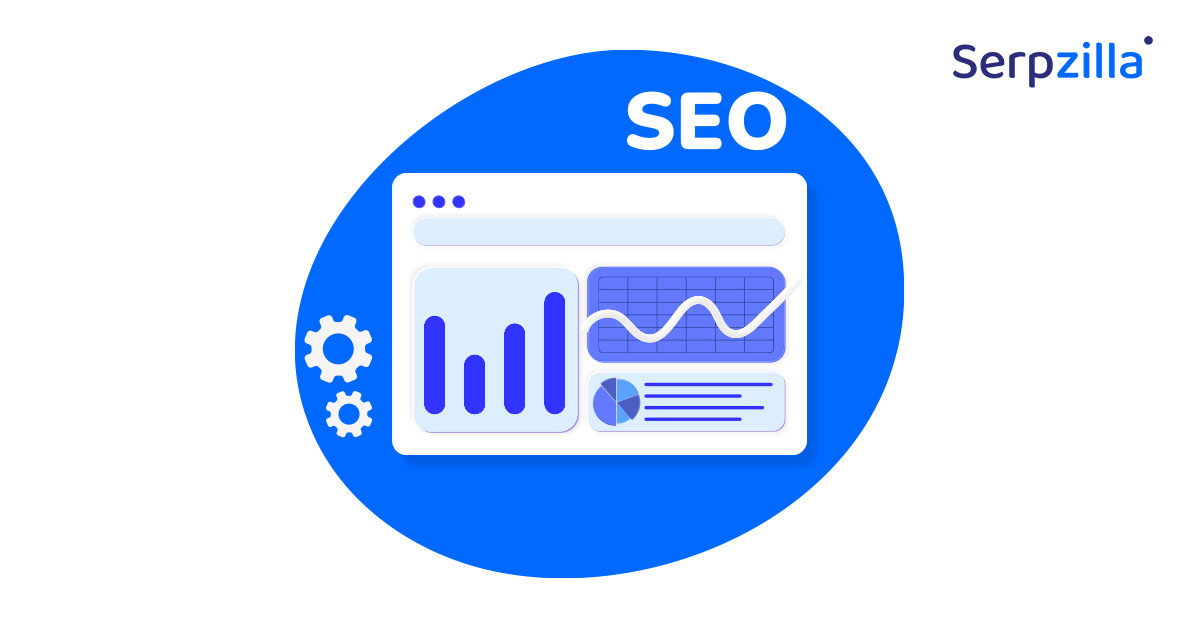Are you a nutritionist? Does your business lie in the wellness and / or fitness domain? In 2025 you, along with many of your peers are probably trying to reach your potential customers online. If you want to make sure your site is the first stop for the health-conscious surfer, here’s a cheat sheet for you. Several concise and working best practices to improve your SEO and stop missing out on important opportunities to find new customers.
On-Page SEO for Nutrition Website
On page SEO refers to how you can optimize your website and other online content for Google to place you higher in search page results. Here are a few actionable tips for you to consider.
- Do Your Keyword Research
When people are looking up nutrition schemes, specialists and services on Google, they can use a wide variety of search queries. Start by figuring out what your potential customers may be looking for if you want them to find your website. Are they looking for “best diet for weight loss” or “how to reduce sugar cravings”? Are they interested in “vitamins to improve mood” or maybe ‘what supplements a breastfeeding mom can take? The longer the list of keywords is and the more specific they are, the better. You can use tools like Google Keyword Planner or Ubersuggest to get the scoop on popular search terms in your domain. After you determine the list of keywords, you can use them in your content. However, remember, it’s not about stuffing these keywords everywhere but weaving them smartly into your content.
The image below illustrates 10 most popular nutrition-related search keywords and their search volume:
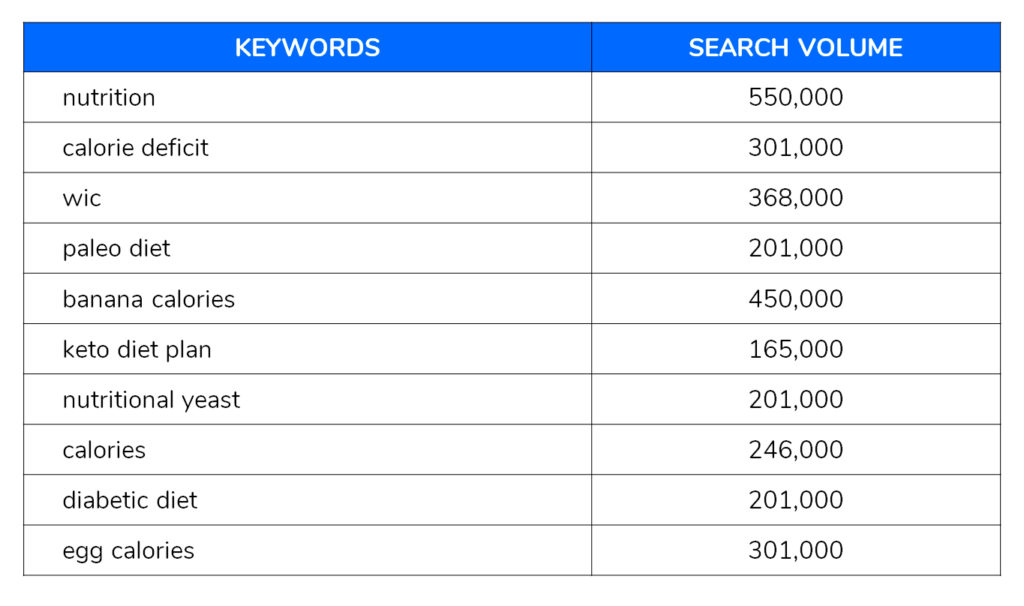
2. Content Creation and Optimization
Wellness sphere already has a dense competition and a mature online market where content is king. So, you need to opt for high-quality, useful, accurate and unambiguous content that people will find reliable and digestible. If you post easy-to-read, smart, engaging content, people will not only read it. They will share it on social media, and bring it up in various online discussions. If they find you a reliable enough source, they will gladly follow you. Invest in content creation and don’t forget to smoothly optimize it for your desired keywords. For instance you can start out by creating a series of blog posts with answers to simple often searched questions: “What are the benefits of Omega-3?” or “Keto diet basics.” If people who are into healthy lifestyles find your content useful, they will come back for seconds.
3. Check Your Meta Tags and Headlines
In SEO, meta tags, titles, and headlines are like labels on food packaging. They help search engines and readers alike to understand what your content is about without having to analyze it in its entirety. Make sure the most important information, such as prominent keywords, are included there. Your meta description should be a tasty snippet of what to expect in the article. Headlines should be catchy enough to make people want to click.
Technical SEO
Now, let’s talk about some technical aspects of SEO optimization.
- Website Speed and Performance
If your website loads slower than it takes to peel an orange, you’ve lost your audience. Speed is a huge deal, as well as how comfortable it is for your users to browse your site. Optimize images, clean up any unnecessary code and make sure that important content is only a couple of clicks away for your users.
- Mobile Optimization
Chances are, your audience is googling for supplements, diets, and vitamins while commuting or during a lunch break. Make sure your website looks good on mobile devices. A responsive design adjusts to any screen size, this makes your site easy to navigate whether it’s accessed from a smartphone or a tablet. It concerns all types of your content – social media posts, videos and text content.

E-E-A-T
Google loves a good diet of E-E-A-T: Expertise, Experience, Authority, and Trustworthiness. Display your certifications, share your success stories, and contribute guest posts to reputable health sites. Invest in making your personal brand as a specialist or your company’s brand reliable and well-received. Check your reviews, communicate and build rapport with the audience. This builds your site’s reputation and tells Google you’re legit and should be placed higher in search results.
Building trust with users is always a marathon, so don’t expect quick results and prepare for a long journey. Establishing partnerships with known experts in the field, doing collaborations, participating in various online and offline events is a good way to create a network that will promote you as an expert in your field.
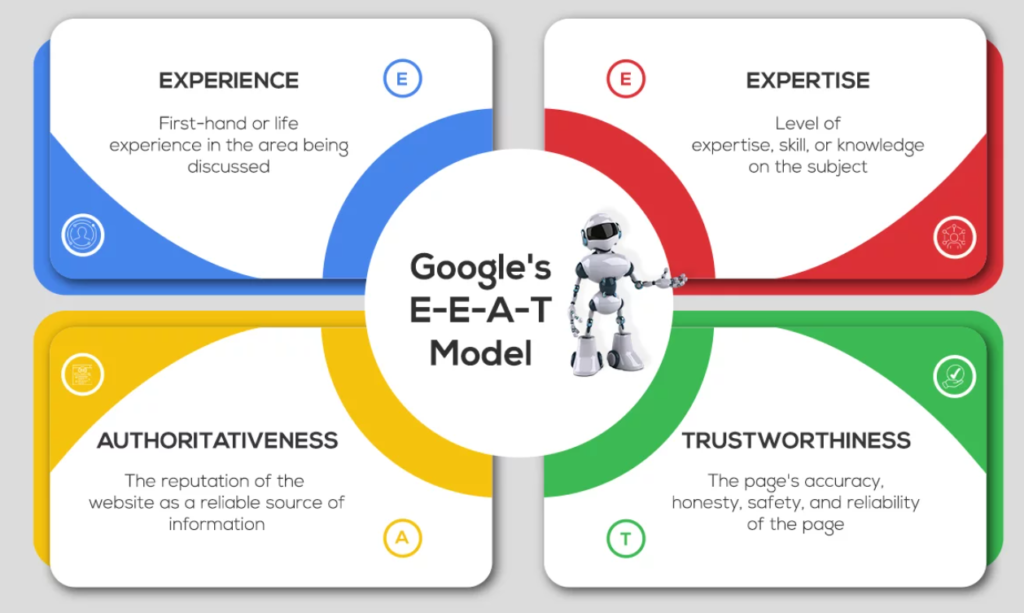
Off-Page SEO for Nutritionists and Dieticians
Off-page SEO refers to optimization activities you should carry out outside of your site: on social media, on mass media, on various other websites and listings. Here are a few things you can do to externally promote your site to increase your Google search rankings.
- Social Media
Use your Instagram, Facebook, Twitter or social networks of your choice. Google doesn’t count likes and reblogs directly in their ranks. However, when you are active on social media, it drives audiences to your website. You can also use these platforms to connect with your audience. Share quick tips, healthy recipes, and behind-the-scenes peeks of your daily routine.
- Quality Backlinks
Investigating a little deeper into link building and link quality is certainly worth your while. The more reputable sites linking to your website, the more trusted you appear, the more often people come across mentions about you. Guest blogging on health and wellness sites, participating in podcasts, or being featured in interviews can earn you valuable backlinks.
If you provide offline services or have an offline practice, focusing your SEO efforts on local resources is a great option. It will save you money, because you don’t have to cover large geographical areas, and it will help you reach local customers. Claim your Google My Business listing, keep your contact info updated, get listed in local business boards.
- Online Reviews
It’s the 21st century, and people still rely on word of mouth as the best source of recommendation. That is why it is crucial for you to monitor your online reviews on Google or on niche review sites. Encourage happy customers to leave positive reviews and politely address negative reviews. Yes, your correct response to a review by an unhappy customer can actually let people know that you are not above admitting a mistake and trying to make amends. A lot of people consider such interaction as a positive decision-making factor.
Tracking and Analyzing your SEO Efforts
Keeping close tabs on your SEO campaign is one of the most important parts of its success. If there’s something that’s going wrong, constant monitoring will let you nip it in the bud. You will also be able to notice immediate results and scale them.
- Use Google Analytics
A free tool that gives you an excellent overall picture of your traffic, visitors and other metrics. Using it, you can make conclusions about your site’s performance, your customer behavior and see where your weak spots are: for example, if a lot of customers visit, but never go through the procedure of leaving contacts to receive freebies.
- Monitor your keyword rankings
The keyword pool is a complex system where changes can be swift. Be on the constant outlook for less obvious keywords: people may use them, but they may be less expensive to optimize for. Use tools like Google Search Console, Ahrefs, or SEMrush to track your rankings over time. They also will help you to discover new keywords and notice shifts in user search patterns.
- Evaluate your Backlink Profile
Toxic backlinks can ruin all your SEO efforts in no time and beyond repair. It is crucial to study and analyze who is linking to you. Check these sites for authority, trustworthiness and check the link itself for relevance. It should have an obvious logical connection to the source. For instance, a site about race cars linking to your post about supplements for vegans may seem suspicious to Google. But a site about race cars linking to your post about vitamins for sustaining high energy levels for active sports may be very relevant indeed.
- Audit and Adjust your SEO
SEO is a very fluid and fast-paced field. It is a constant process of finding balance in a highly shifting world of people searches and popular topics. That is why you should constantly review your tactics, spot and scale successful ones, try out new ones, get rid of the ones that are not working or working to your detriment.
Boost your SEO results! Link building has become fast and easy with Serpzilla. Buy quality backlinks on authority websites with high DR.
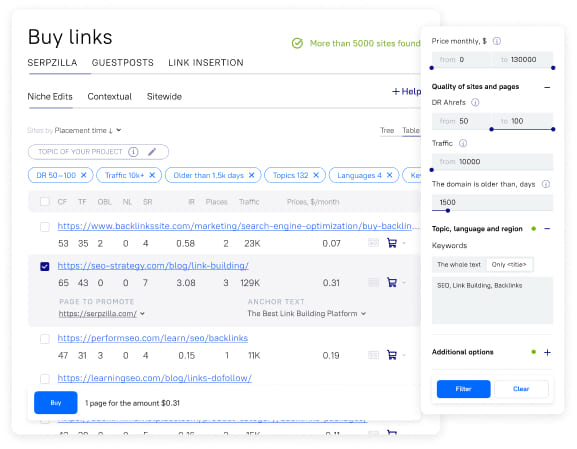
Conclusion
Being a nutritionist or a practitioner in the sphere of wellness, you may feel very much removed from SEO. However, following a few best practices described above will let you make your website more visible to your potential customers, to gain following and discover new audiences. Ultimately, it will help your business grow.




